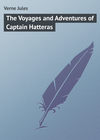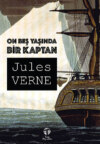Kitabı oku: «The Voyages and Adventures of Captain Hatteras», sayfa 14
CHAPTER XXIX
ACROSS THE ICE-FIELDS
The little band made their way towards the southeast. Simpson drove the sledge. Duke aided him much, without being disturbed at the occupation of his mates. Hatteras and the doctor followed behind on foot, while Bell, who was charged with making a road, went on in advance, testing the ice with the iron point of his stick.
The rise in the thermometer foretold a fall of snow, and soon it came, beginning in large flakes. This added to the hardships of their journey; they kept straying from a straight line; they could not go quickly; nevertheless, they averaged three miles an hour.
The ice-field, under the pressure of the frost, presented an unequal surface; the sledge was often nearly turned over, but they succeeded in saving it.
Hatteras and his companions wrapped themselves up in their fur clothes cut in the Greenland fashion; they were not cut with extraordinary neatness, but they suited the needs of the climate; their faces were enclosed in a narrow hood which could not be penetrated by the snow or wind; their mouths, noses, and eyes were alone exposed to the air, and they did not need to be protected against it; nothing is so inconvenient as scarfs and nose-protectors, which soon are stiff with ice; at night they have to be cut away, which, even in the arctic seas, is a poor way of undressing. It was necessary to leave free passage for the breath, which would freeze at once on anything it met.
The boundless plain stretched out with tiresome monotony; everywhere there appeared heaped-up ice-hills, hummocks, blocks, and icebergs, separated by winding valleys; they walked staff in hand, saying but little. In this cold atmosphere, to open the mouth was painful; sharp crystals of ice suddenly formed between the lips, and the heat of the breath could not melt them. Their progress was silent, and every one beat the ice with his staff. Bell's footsteps were visible in the fresh snow; they followed them mechanically, and where he had passed, the others could go safely.
Numerous tracks of bears and foxes crossed one another everywhere; but during this first day not one could be seen; to chase them would have been dangerous and useless: they would only have overloaded the already heavy sledge.
Generally, in excursions of this sort, travellers take the precaution of leaving supplies along their path; they hide them from the animals, in the snow, thus lightening themselves for their trip, and on their return they take the supplies which they did not have the trouble of carrying with them.
Hatteras could not employ this device on an ice-field which perhaps was moving; on firm land it would have been possible; and the uncertainty of their route made it doubtful whether they would return by the same path.
At noon, Hatteras halted his little troop in the shelter of an ice-wall; they dined off pemmican and hot tea; the strengthening qualities of this beverage produced general comfort, and the travellers drank a large quantity. After an hour's rest they started on again; in the first day they walked about twenty miles; that evening men and dogs were tired out.
Still, in spite of their fatigue, they had to build a snow-house in which to pass the night; the tent would not have been enough. This took them an hour and a half. Bell was very skilful; the blocks of ice, which were cut with a knife, were placed on top of one another with astonishing rapidity, and they took the shape of a dome, and a last piece, the keystone of the arch, established the solidity of the building; the soft snow served as mortar in the interstices; it soon hardened and made the whole building of a single piece.
Access was had into this improvised grotto by means of a narrow opening, through which it was necessary to crawl on one's hands and knees; the doctor found some difficulty in entering, and the others followed. Supper was soon prepared on the alcohol cooking-stove. The temperature inside was very comfortable; the wind, which was raging without, could not get in.
"Sit down!" soon shouted the doctor in his most genial manner.
And this meal, though the same as the dinner, was shared by all. When it was finished their only thought was sleep; the mackintoshes, spread out upon the snow, protected them from the dampness. At the flame of the portable stove they dried their clothes; then three of them, wrapped up in their woollen coverings, fell asleep, while one was left on watch; he had to keep a lookout on the safety of all, and to prevent the opening from being closed, otherwise they ran a risk of being buried alive.
Duke shared their quarters; the other dogs remained without, and after they had eaten their supper they lay down and were soon hidden by the snow.
Their fatigue soon brought sound sleep. The doctor took the watch until three of the morning. In the night the hurricane raged furiously. Strange was the situation of these lonely men lost in the snow, enclosed in this vault with its walls rapidly thickening under the snow-fall.
The next morning at six o'clock their monotonous march was resumed; there were ever before them the same valleys and icebergs, a uniformity which made the choice of a path difficult. Still, a fall of several degrees in the temperature made their way easier by hardening the snow. Often they came across little elevations, which looked like cairns or storing-places of the Esquimaux; the doctor had one destroyed to satisfy his curiosity, but he found nothing except a cake of ice.
"What do you expect to find, Clawbonny?" asked Hatteras; "are we not the first men to penetrate into this part of the globe?"
"Probably," answered the doctor, "but who knows?"
"Don't let us waste our time in useless searching," resumed the captain; "I am in a hurry to rejoin the ship, even if this long-wanted fuel should not be found."
"I have great hopes of finding it," said the doctor.
"Doctor," Hatteras used to say frequently, "I did wrong to leave the Forward; it was a mistake! The captain's place is on board, and nowhere else."
"Johnson is there."
"Yes! but – let us hurry on!"
They advanced rapidly; Simpson's voice could be heard urging on the dogs; they ran along on a brilliant surface, all aglow with a phosphorescent light, and the runners of the sledge seemed to toss up a shower of sparks. The doctor ran on ahead to examine this snow, when suddenly, as he was trying to jump upon a hummock, he disappeared from sight. Bell, who was near him, ran at once towards the place.
"Well, Doctor," he cried anxiously, while Hatteras and Simpson joined him, "where are you?"
"Doctor!" shouted the captain.
"Down here, at the bottom of a hole," was the quiet answer. "Throw me a piece of rope, and I'll come up to the surface of the globe."
They threw a rope down to the doctor, who was at the bottom of a pit about ten feet deep; he fastened it about his waist, and his three companions drew him up with some difficulty.
"Are you hurt?" asked Hatteras.
"No, there's no harm done," answered the doctor, wiping the snow from his smiling face.
"But how did it happen?"
"O, it was in consequence of the refraction," he answered, laughing; "I thought I had about a foot to step over, and I fell into this deep hole! These optical illusions are the only ones left me, my friends, and it's hard to escape from them! Let that be a lesson to us all never to take a step forward without first testing the ice with a staff, for our senses cannot be depended on. Here our ears hear wrong, and our eyes deceive us! It's a curious country!"
"Can you go on?" asked the captain.
"Go on, Hatteras, go on! This little fall has done me more good than harm."
They resumed their march to the southeast, and at evening they halted, after walking about twenty-five miles; they were all tired, but still the doctor had energy enough to ascend an ice-mountain while the snow-hut was building.
The moon, which was nearly at its full, shone with extraordinary brilliancy in a clear sky; the stars were wonderfully brilliant; from the top of the iceberg a boundless plain could be seen, which was covered with strangely formed hillocks of ice; in the moonlight they looked like fallen columns or overthrown tombstones; the scene reminded the doctor of a huge, silent graveyard barren of trees, in which twenty generations of human beings might be lying in their long sleep.
In spite of the cold and fatigue, Clawbonny remained for a long time in a revery, from which it was no easy task for his companions to arouse him; but they had to think of resting; the snow-hut was completed; the four travellers crawled in like moles, and soon were all asleep.
The following days went on without any particular incident; at times they went on slowly, at times quickly, with varying ease, according to the changes in the weather; they wore moccasins or snow-shoes, as the nature of the ice demanded.
In this way they went on till January 15th; the moon, now in its last quarter, was hardly visible; the sun, although always beneath the horizon, gave a sort of twilight for six hours every day, but not enough to light up the route, which had to be directed by the compass. Then Bell went on ahead; Hatteras followed next; Simpson and the doctor sought also to keep in a straight line behind, with their eyes on Hatteras alone; and yet, in spite of all their efforts, they often got thirty or forty degrees from the right way, much to their annoyance.
Sunday, January 15th, Hatteras judged that they had come about one hundred miles to the south; this morning was set aside to mending their clothes and materials; the reading of divine service was not forgotten.
At noon they started again; the temperature was very low; the thermometer marked only -22°;27 the air was very clear.
Suddenly, without warning, a frozen vapor arose into the air from the ice, to a height of about ninety feet, and hung motionless; no one could see a foot before him; this vapor formed in long, sharp crystals upon their clothing.
The travellers, surprised by this phenomenon, which is called frost-rime, only thought of getting together; so immediately various shouts were heard: —
"O Simpson!"
"Bell, this way!"
"Dr. Clawbonny!"
"Doctor!"
"Captain, where are you?"
They began to look for one another with outstretched arms, wandering through the fog which their eyes could not pierce. But to their disappointment they could hear no answer; the vapor seemed incapable of carrying sound.
Each one then thought of firing his gun as a signal to the others. But if their voices were too feeble, the reports of the fire-arms were too loud; for the echoes, repeated in every direction, made but a confused roar, in which no particular direction could be perceived.
Then they began to act, each one as he thought best. Hatteras stood still and folded his arms. Simpson contented himself with stopping the sledge. Bell retraced his steps, feeling them with his hand. The doctor, stumbling over the blocks of ice, wandered here and there, getting more and more bewildered.
At the end of five minutes he said to himself, —
"This can't last long! Singular climate! This is too much! There is nothing to help us, without speaking of these sharp crystals which cut my face. Halloo, Captain!" he shouted again.
But he heard no answer; he fired his gun, but in spite of his thick gloves the iron burned his hands. Meanwhile he thought he saw a confused mass moving near him.
"There's some one," he said. "Hatteras! Bell! Simpson! Is that you? Come, answer!"
A dull roar was alone heard.
"Ah!" thought the doctor, "what is that?"
The object approached; it lost its first size and appeared in more definite shape. A terrible thought flashed into the doctor's mind.
"A bear!" he said to himself.
In fact, it was a huge bear; lost in the fog, it came and went with great danger to the men, whose presence it certainly did not suspect.
"Matters are growing complicated!" thought the doctor, standing still.
Sometimes he felt the animal's breath, which was soon lost in the frost-rime; again he would see the monster's huge paws beating the air so near him that his clothes were occasionally torn by its sharp claws; he jumped back, and the animal disappeared like a phantasmagoric spectre.
But as he sprang back he found an elevation beneath his feet; he climbed up first one block of ice, then another, feeling his way with his staff.
"An iceberg!" he said to himself; "if I can get to the top I am safe."
With these words he climbed up an elevation of about ninety feet with surprising agility; he arose above the frozen mist, the top of which was sharply defined.
"Good!" he said to himself; and looking about him he saw his three companions emerging from the vapor.
"Hatteras!"
"Dr. Clawbonny!"
"Bell!"
"Simpson!"
These names were shouted out almost at the same time; the sky, lit up by a magnificent halo, sent forth pale rays which colored the frost-rime as if it were a cloud, and the top of the icebergs seemed to rise from a mass of molten silver. The travellers found themselves within a circle of less than a hundred feet in diameter. Thanks to the purity of the air in this upper layer in this low temperature, their words could be easily heard, and they were able to talk on the top of this iceberg. After the first shots, each one, hearing no answer, had only thought of climbing above the mist.
"The sledge!" shouted the captain.
"It's eighty feet beneath us," answered Simpson.
"Is it all right?"
"All right."
"And the bear?" asked the doctor.
"What bear?" said Bell.
"A bear!" said Hatteras; "let's go down."
"No!" said the doctor; "we shall lose our way, and have to begin it all over again."
"And if he eats our dogs – " said Hatteras.
At that moment Duke was heard barking, the sound rising through the mist.
"That's Duke!" shouted Hatteras; "there's something wrong. I'm going down."
All sorts of howling arose to their ears; Duke and the dogs were barking furiously. The noise sounded like a dull murmur, like the roar of a crowded, noisy room. They knew that some invisible struggle was going on below, and the mist was occasionally agitated like the sea when marine monsters are fighting.
"Duke, Duke!" shouted the captain, as he made ready to enter again into the frost-rime.
"Wait a moment, Hatteras, – wait a moment! It seems to me that the fog is lifting."
It was not lifting, but sinking, like water in a pool; it appeared to be descending into the ground from which it had risen; the summits of the icebergs grew larger; others, which had been hidden, arose like new islands; by an optical illusion, which may be easily imagined, the travellers, clinging to these ice-cones, seemed to be rising in the air, while the top of the mist sank beneath them.
Soon the top of the sledge appeared, then the harnessed dogs, and then about thirty other animals, then great objects moving confusedly, and Duke leaping about with his head alternately rising and sinking in the frozen mist.
"Foxes!" shouted Bell.
"Bears!" said the doctor; "one, two, three."
"Our dogs, our provisions!" cried Simpson.
A troop of foxes and bears, having come across the sledge, were ravaging the provisions. Their instinct of pillaging united them in perfect harmony; the dogs were barking furiously, but the animals paid no heed, but went on in their work of destruction.
"Fire!" shouted the captain, discharging his piece.
His companions did the same. But at the combined report the bears, raising their heads and uttering a singular roar, gave the signal to depart; they fell into a little trot which a galloping horse could not have kept up with, and, followed by the foxes, they soon disappeared amid the ice to the north.
CHAPTER XXX
THE CAIRN
This phenomenon, which is peculiar to the polar regions, had lasted three quarters of an hour; the bears and foxes had had plenty of time; these provisions arrived opportunely for these animals, who were nearly starved during the inclement weather; the canvas cover of the sledge was torn by their strong claws, the casks of pemmican were opened and emptied; the biscuit-sacks pillaged, the tea spilled over the snow, a barrel of alcohol torn open and its contents lost, their camping materials scattered and damaged, bore witness to the ferocity of these wild beasts, and their greediness.
"This is a misfortune," said Bell, gazing at this scene of ruin.
"Which is probably irreparable," said Simpson.
"Let us first estimate the loss," interrupted the doctor, "and we'll talk about it afterwards."
Hatteras, without saying a word, began to gather the scattered boxes and sacks; they collected the pemmican and biscuits which could be eaten; the loss of part of their alcohol was much to be regretted; for if that was gone there would be nothing warm to drink; no tea, no coffee. In making an inventory of the supplies left, the doctor found two hundred pounds of pemmican gone, and a hundred and fifty pounds of biscuit; if their journey continued they would have to subsist on half-rations.
They then began to discuss what should be done, whether they should return to the ship and start out again. But how could they make up their minds to lose the hundred and fifty miles they had already made? To return without fuel would have a depressing effect upon the spirits of the crew. Could men be found again to resume their march across the ice?
Evidently it was better to push on, even at the risk of severe privations.
The doctor, Hatteras, and Bell were of this opinion; Simpson wanted to go back; the fatigue of the journey had worn upon his health; he was visibly weaker; but finding himself alone of this opinion, he resumed his place at the head of the sledge, and the little caravan continued its journey to the south.
During the three next days, from the 15th to the 17th of January, all the monotonous incidents of the voyage were repeated; they advanced more slowly, and with much fatigue; their legs grew tired; the dogs dragged the sledge with difficulty; their diminished supply of food could not comfort men or beasts. The weather was very variable, changing from intense, dry cold to damp, penetrating mists.
January 18th the aspect of the ice-fields changed suddenly; a great number of peaks, like sharp-pointed pyramids, and very high, appeared at the horizon; the ground in certain places came through the snow; it seemed formed of gneiss, schist, and quartz, with some appearance of limestone. The travellers at last touched earth again, and this land they judged to be that called North Cornwall.
The doctor could not help striking the earth with joy; they had now only a hundred miles to go before reaching Cape Belcher, but their fatigue increased strangely on this soil, covered with sharp rocks, and interspersed with dangerous points, crevasses, and precipices; they had to go down into the depths of these abysses, climb steep ascents, and cross narrow gorges, in which the snow was drifted to the depth of thirty or forty feet.
The travellers soon regretted the almost easy journey over the ice-fields, which so well suited the sledge; now it had to be dragged by main force; the weary dogs were insufficient; the men, compelled to take their place alongside of them, wore themselves out with hauling; often they had to take off the whole load to get over some steep hills; a place only ten feet wide often kept them busy for hours; so in this first day they made only five miles in North Cornwall, which is certainly well named, for it exhibits all the roughness, the sharp points, the steep gorges, the confused rockiness, of the southwest coast of England.
The next day the sledge reached the top of the hills near the shore; the exhausted travellers, being unable to make a snow-hut, were obliged to pass the night under the tent, wrapped up in buffalo-skins, and drying their wet stockings by placing them about their bodies. The inevitable consequences of such conduct are easily comprehended; that night the thermometer fell below -44°, and the mercury froze.
Simpson's health caused great anxiety; a persistent cough, violent rheumatism, and intolerable pain obliged him to lie on the sledge which he could no longer guide. Bell took his place; he too was suffering, but not so much as to be incapacitated. The doctor also felt the consequences of this trip in this terrible weather; but he uttered no complaint; he walked on, resting on his staff; he made out the way and helped every one. Hatteras, impassible, and as strong as on the first day, followed the sledge in silence.
January 20th the weather was so severe that the slightest effort produced complete prostration. Still, the difficulties of the way were so great, that Hatteras, the doctor, and Bell harnessed themselves with the dogs; sudden shocks had broken the front of the sledge, and they had to stop to repair it. Such delays were frequent every day.
The travellers followed a deep ravine, up to their waists in snow, and perspiring violently in spite of the intense cold. They did not say a word. Suddenly Bell, who was near the doctor, looked at him with some alarm; then, without uttering a word, he picked up a handful of snow and began rubbing his companion's face violently.
"Well, Bell!" said the doctor, resisting.
But Bell continued rubbing.
"Come, Bell," began the doctor again, his mouth, nose, and eyes full of snow, "are you mad? What's the matter?"
"If you have a nose left," answered Bell, "you ought to be grateful to me."
"A nose!" answered the doctor, quickly, clapping his hand to his face.
"Yes, Doctor, you were frost-bitten; your nose was white when I looked at you, and if I had not done as I did, you would have lost that ornament which is in the way on a journey, but agreeable to one's existence."
In fact, the doctor's nose was almost frozen; the circulation of the blood was restored in time, and, thanks to Bell, all danger was gone.
"Thanks, Bell!" said the doctor; "I'll be even with you yet."
"I hope so, Doctor," the carpenter answered; "and may Heaven protect us from worse misfortunes!"
"Alas, Bell," continued the doctor, "you mean Simpson! The poor fellow is suffering terribly."
"Do you fear for his life?" asked Hatteras, quickly.
"Yes, Captain," answered the doctor.
"And why?"
"He has a violent attack of scurvy; his legs have begun to swell, and his gums too; the poor fellow lies half frozen on the sledge, and every movement redoubles his suffering. I pity him, Hatteras, and I can't do anything to relieve him."
"Poor Simpson!" murmured Bell.
"Perhaps we shall have to halt for a day or two," resumed the doctor.
"Halt!" shouted Hatteras, "when the lives of eighteen men are hanging on our return!"
"Still – " said the doctor.
"Clawbonny, Bell, listen to me," said Hatteras; "we have food for only twenty days! Judge for yourselves whether we can stop for a moment!"
Neither the doctor nor Bell made any reply, and the sledge resumed its progress, which had been delayed for a moment. That evening they stopped beneath a hillock of ice, in which Bell at once cut a cavern; the travellers entered it; the doctor passed the night attending to Simpson; the scurvy had already made fearful ravages, and his sufferings caused perpetual laments to issue from his swollen lips.
"Ah, Dr. Clawbonny!"
"Courage, my dear fellow!" said the doctor.
"I shall never get well! I feel it! I'd rather die!"
The doctor answered these despairing words by incessant cares; although worn out by the fatigue of the day, he spent the night in composing a soothing potion for his patient; but the lime-juice was ineffectual, and continual friction could not keep down the progress of the scurvy.
The next day he had to be placed again upon the sledge, although he besought them to leave him behind to die in peace; then they resumed their dreary and difficult march.
The frozen mists penetrated the three men to the bone; the snow and sleet dashed against them; they were working like draught-horses, and with a scanty supply of food.
Duke, like his master, kept coming and going, enduring every fatigue, always alert, finding out by himself the best path; they had perfect confidence in his wonderful instinct.
During the morning of January 23d, amid almost total darkness, for the moon was new, Duke had run on ahead; for many hours he was not seen; Hatteras became uneasy, especially because there were many traces of bears to be seen; he was uncertain what to do, when suddenly a loud barking was heard.
Hatteras urged on the sledge, and soon he found the faithful animal at the bottom of a ravine. Duke stood as motionless as if turned to stone, barking before a sort of cairn made of pieces of limestone, covered with a cement of ice.
"This time," said the doctor, detaching his harness, "it's a cairn, there's no doubt of that."
"What's that to us?" asked Hatteras.
"Hatteras, if it is a cairn, it may contain some document of value for us; perhaps some provisions, and it would be worth while to see."
"What European could have come as far as this?" asked Hatteras, shrugging his shoulders.
"But in lack of Europeans," answered the doctor, "cannot Esquimaux have made it here to contain what they have fished or shot? It's their habit, I think."
"Well, go and look at it," continued Hatteras; "but I'm afraid it will be hardly worth your while."
Clawbonny and Bell walked to the cairn with picks in their hands. Duke continued barking furiously. The limestones were firmly fastened together by the ice; but a few blows scattered them on the ground.
"There's something there, evidently," said the doctor.
"I think so," answered Bell.
They rapidly destroyed the cairn. Soon they found a bundle and in it a damp paper. The doctor took it with a beating heart. Hatteras ran forward, seized the paper, and read: —
"Altam… Porpoise, December 13, 1860, longitude 12..°, latitude 8..° 35'."
"The Porpoise?" said the doctor.
"The Porpoise!" replied Hatteras. "I never heard of a ship of this name in these seas."
"It is clear," resumed the doctor, "that travellers, perhaps shipwrecked sailors, have been here within two months."
"That is sure," said Bell.
"What are we going to do?" asked the doctor.
"Push on," answered Hatteras, coldly. "I don't know anything about any ship called the Porpoise, but I know that the brig Forward is waiting for our return."




















